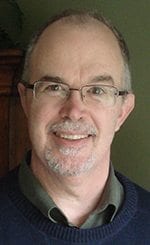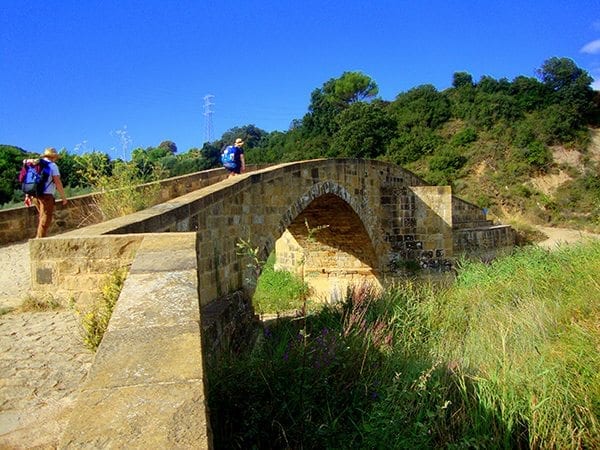By Charles Whelton, MD, FRCP (C), ABAM
Psychiatrist, Maple Team, Edgewood Treatment Centre
As a psychiatrist, I’m good at talking the talk.
I listen to people, assess their situation as best I can, and then I give it to them with both barrels. Advice, counsel, guidance, help, direction, recommendations, suggestions, tips. I’m full of it, some might say.

DR. CHARLES WHELTON
I can tell others where they went wrong, what’s medically wrong with them, and what they should or shouldn’t do. But what about myself? Can I follow my own advice? I can talk the talk, but can I walk the walk?
In point of fact, I love walking the walk. Or, more specifically, I love walking the Camino. I walked it again this summer. Every time I go back, it teaches me something.
The Camino de Santiago, Spanish for the Way of St. James, is a road of pilgrimage which ends at the shrine of the apostle St. James in Santiago de Compostela, Spain.
There are many travelers on the road. They come from a tradition of pilgrimage, beginning over a thousand years ago, when the bones of Saint James the Apostle were discovered in what is now Santiago. Pilgrims started coming, initially in a trickle and then by the thousands, and the routes were formed. The most common path is the Camino Francés, which starts in southern France, crosses the Pyrenees, travels across northern Spain and ends in Galicia, the province where Santiago is located. The Camino is about 780 km and takes about 35 days to complete the whole walk.
 The route is sometimes along a road, and sometimes it’s a path through woods, along streams, over mountains. Sometimes it runs through towns and cities, but mostly it’s in the countryside, connecting the small villages of Spain. There are cafés and shops along the way for provisions and plenty of albergues, or hostels, in which to sleep.
The route is sometimes along a road, and sometimes it’s a path through woods, along streams, over mountains. Sometimes it runs through towns and cities, but mostly it’s in the countryside, connecting the small villages of Spain. There are cafés and shops along the way for provisions and plenty of albergues, or hostels, in which to sleep.
The Camino reminds me that life is simple. You don’t really need much. A sleeping bag, some extra socks and underwear, a water bottle, a little money. I could carry all of it on my back. The Camino provided the rest – I just had to trust it.
We get so caught up and distracted in the chaos of everyday life. The tyranny of the ‘shoulds’. We should have more – more money, more stuff, a newer car, better hair, a newer cellphone. It’s never enough. Sort of sounds like addiction. We can never close the gap between where we are and where we think we should be. We get a little farther along and the gap moves, too.
You forget about those things on the Camino. All you have to do is get up, pull on your boots, and walk. That’s it. The things that matter on the Camino aren’t what you have or how powerful you are. What matters is that you’re there, walking. What matters are movement and colour and peace, not necessarily in that order.
Who comes to the Camino? Spiritually motivated ones who come for a pilgrimage, young people who want to experience the world, travelers who want to explore Spain, adventurers who want a healthy eco-holiday, older folks who want to rediscover the meaning of life. The religious and the devout. And the people without a spiritual bone in their body, too. People in terrific shape and people who aren’t. Modern peregrinos, or pilgrims, include Spanish, French, German, Italian, Australian, Irish, Korean, Peruvian, Lithuanian – they come from around the world to walk the Camino.
At first, your feet will hurt. Your legs will hurt. You will likely get blisters. It happens to almost everyone.
It’s hard work. You keep walking and it gets better. You develop a rhythm. You get up in the morning and walk when it’s cool. If it’s raining, you put on your poncho.
 While you walk, nothing else matters except that you’re walking. Your world is on your back, and you don’t need anything else. You walk through an amazingly beautiful country on an ancient route which others have walked for a thousand years. You start to think about what matters. You meditate. You pray. You become thankful for the little things – a cool breeze, the talk you had at dinner last night with Alex from Russia, the cup of coffee that’s coming up in the next town. Your body is tired and a little sore and you smell bad, but you’re okay with that.
While you walk, nothing else matters except that you’re walking. Your world is on your back, and you don’t need anything else. You walk through an amazingly beautiful country on an ancient route which others have walked for a thousand years. You start to think about what matters. You meditate. You pray. You become thankful for the little things – a cool breeze, the talk you had at dinner last night with Alex from Russia, the cup of coffee that’s coming up in the next town. Your body is tired and a little sore and you smell bad, but you’re okay with that.
Some peregrinos come on their own. Many come with friends or partners, but find that they walk on their own anyway. Ultimately, we all walk alone in life, but together. Everyone walks their own Camino.
Eventually, the Camino strips away the superficial and fosters openness, honesty, humility. You keep crossing paths with the same peregrinos, day after day, and friendships form. It begins to feel like family. There is a lot of respect in Spain for those who are walking and, day by day, as you let go of everything else and just walk, you take on that respect, you earn it, and you come to respect your fellow peregrinos who are earning it too.
 Walking the Camino has a lot in common with coming to treatment, with the long, slow walk to recovery. Anyone can start that walk. You don’t need much except willingness. At first it hurts a little, but it gets easier. You develop a rhythm and you keep going. It reinforces self-respect, and a healthy respect for others on the walk of recovery. And it leads to honest relationships and true friendships.
Walking the Camino has a lot in common with coming to treatment, with the long, slow walk to recovery. Anyone can start that walk. You don’t need much except willingness. At first it hurts a little, but it gets easier. You develop a rhythm and you keep going. It reinforces self-respect, and a healthy respect for others on the walk of recovery. And it leads to honest relationships and true friendships.
Anyone can talk the talk, but it takes courage and commitment to walk the walk.
I hope you are on the journey to recovery. As they say in Spain, buen camino!



